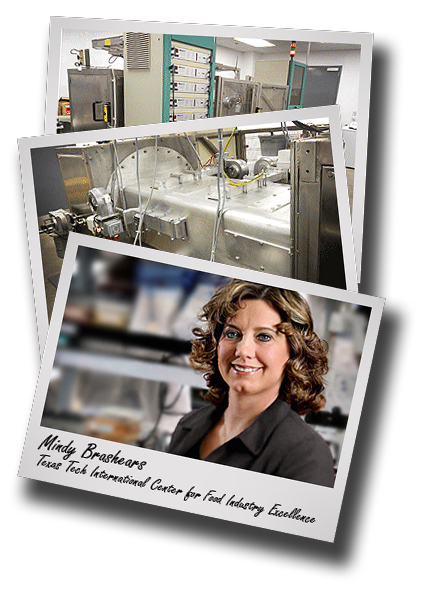In Profile: Brashears says cooking up MicroZap was a nine years in the making

While the results of a new food-purifying technology designed by a Texas Tech research team may be instant, the instant success being seen by its spin-off company, MicroZap, has actually been in the works for years. Key to MicroZap's ground-breaking process is use of microwave technology to purify food and water.
"It's been almost nine years since we've started this process," said Mindy Brashears, director of Tech's International Center for Food Industry Excellence. Simply put, MicroZap's technology will heat, but not directly damage the DNA of a biological substance. She believes the technology can have a huge impact on food security, which could mean providing the world with a safe, abundant food and water supply.
"We started with whole eggs," Brashears said. "You can take a whole egg, put it through the microwave and pasteurize it, kill the salmonella without cooking the egg and without changing the functional properties. You can still make a meringue out of it, it still looks like a fried egg if you fry it "" this just shows the unique way that we target this energy to kill the bacteria."
In 2010, MicroZap received $1.5 million from the state's Emerging Technology Fund to get the project off the ground. To date, about 150 companies are interested in the microwave technology for use in their facilities, and those are just for food-based products.
In specific terms, the research team uses electro-magnetic radiation (microwaves), which interacts with the molecules in the product or sample and will affect pathogens, bacteria and mold in the different products treated, said Andreas Neuber, associate director of Tech's Center for Pulsed Power and Power Electronics.
"We started MicroZap in 2008, we licensed the original technology from Texas Tech for treatment of eggs and bread," said MicroZap CEO Don Stull. "Since then we've worked with Texas Tech to advance and commercialize the technology." He said they've expanded the technology to other food products including peanuts, produce, pet food, and non-food products such as mold on wine corks.
Reporting by Leslie Cranford
CONTACT: Mindy Brashears, Professor, Department of Animal and Food Sciences, Texas Tech University at (806) 742-2805 ext. 235 or mindy.brashears@ttu.edu
0712NM13
Editor's Note: For full version of story, go to http://today.ttu.edu/2013/05/texas-techs-microwave-technology-leading-to-advances-in-global-food-safety-and-security/
Davis College NewsCenter
-
Address
P.O. Box 42123, Lubbock, Texas 79409-2123, Dean's Office Location:Goddard Building, Room 108 -
Phone
(806)742-2808 -
Email
kris.allen@ttu.edu
